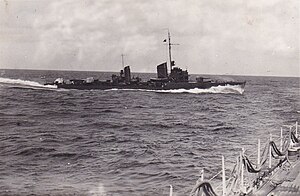 Jaguar at sea, 1934–1935
| |
| History | |
|---|---|
| Name | Jaguar |
| Namesake | Jaguar |
| Builder | Reichsmarinewerft Wilhelmshaven |
| Yard number | 113 |
| Laid down | 4 May 1927 |
| Launched | 15 March 1928 |
| Commissioned | 15 August 1929 |
| Fate | Bombed, 14 June 1944 |
| General characteristics (as built) | |
| Class and type | Type 24 torpedo boat |
| Displacement | |
| Length | 92.6 m (303 ft 10 in) (o/a) |
| Beam | 8.65 m (28 ft 5 in) |
| Draft | 3.52 m (11 ft 7 in) |
| Installed power |
|
| Propulsion |
|
| Speed | 34 knots (63 km/h; 39 mph) |
| Range | 1,997 nmi (3,698 km; 2,298 mi) at 17 knots (31 km/h; 20 mph) |
| Complement | 129 |
| Armament |
|
| Service record | |
| Commanders: | |
Jaguar was the sixth and last Type 24 torpedo boat built for the German Navy (initially called the Reichsmarine and then renamed as the Kriegsmarine in 1935) during the 1920s. The boat made multiple non-intervention patrols during the Spanish Civil War in the late 1930s. During World War II, she played a minor role in the Norwegian Campaign of 1940. Jaguar spent the next several months escorting minelayers as they laid minefields and damaged heavy ships back to Germany before she was transferred to France around September. She started laying minefields herself that month and continued to do so for the rest of the war. After a refit in early 1941, the boat was transferred to the Skaggerak where she was assigned escort duties. Jaguar returned to France in 1942 and was one of the escorts for the capital ships sailing from France to Germany through the English Channel in the Channel Dash. She helped to escort blockade runners, commerce raiders and submarines through the Channel and the Bay of Biscay, as well as Norwegian waters, for the next several years. The boat attacked Allied ships during the Invasion of Normandy in June 1944, but was sunk by British bombers that same month.